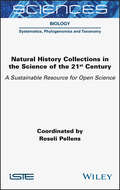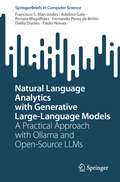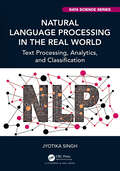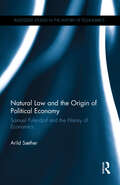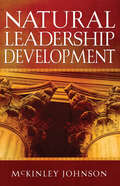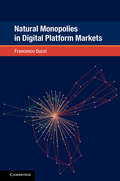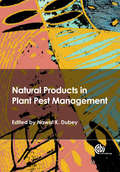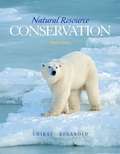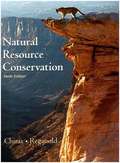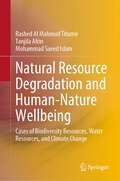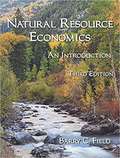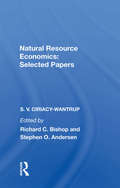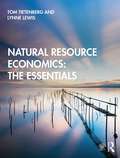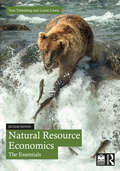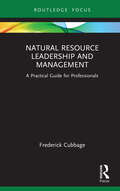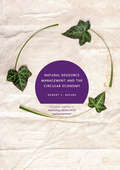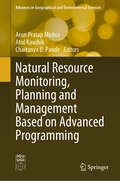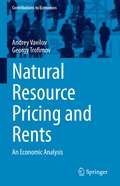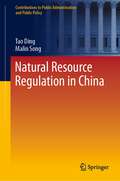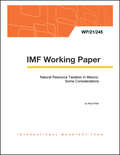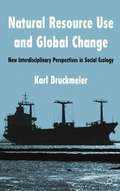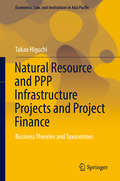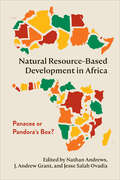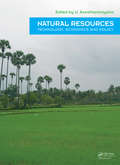- Table View
- List View
Natural History Collections in the Science of the 21st Century: A Sustainable Resource for Open Science
by Roseli PellensNatural history collections have recently acquired an unprecedented place of importance in scientific research. Originally created in the context of systematics and taxonomy, they are now proving to be fundamental for answering various scientific and societal questions that are as significant as they are current.Natural History Collections in the Science of the 21st Century presents a wide range of questions and answers raised by the study of collections. The billions of specimens that have been collected from all around the world over more than two centuries provide us with information that is vital in our quest for knowledge about the Earth, the universe, the diversity of life and the history of humankind.These collections also provide valuable reference points from the past to help us understand the nature and dynamics of global change today. Their physical permanence is the best guarantee we have of a return to data and to information sources in the context of open science.
Natural Language Analytics with Generative Large-Language Models: A Practical Approach with Ollama and Open-Source LLMs (SpringerBriefs in Computer Science)
by Paulo Novais Dalila Durães Francisco S. Marcondes Adelino Gala Renata Magalhães Fernando Perez de BrittoThis book explores the application of generative Large Language Models (LLMs) for extracting and analyzing data from natural language artefacts. Unlike traditional uses of LLMs, such as translation and summarization, this book focuses on utilizing these models to convert unstructured text into data that can be processed through the data science pipeline to generate actionable insights. The content is designed for professionals in diverse fields including cognitive science, linguistics, management, and information systems. It combines insights from both industry and academia to provide a comprehensive understanding of how LLMs can be effectively used for natural language analytics (NLA). The book details practical methodologies for implementing LLMs locally using open-source tools, ensuring data privacy and feasibility without the need for expensive infrastructure. Key topics include interpretant, mindset and cultural analysis, emphasizing the use of LLMs to derive soft data—qualitative information crucial for nuanced decision-making. The text also outlines the technical aspects of LLMs, including their architecture, token embeddings, and the differences between encoder-based and decoder-based models. By providing a case study and practical examples, the authors show how LLMs can be used to meet various analytical needs, making this book a valuable resource for anyone looking to integrate advanced natural language processing techniques into their data analysis workflows.
Natural Language Processing in the Real World: Text Processing, Analytics, and Classification (Chapman & Hall/CRC Data Science Series)
by Jyotika SinghNatural Language Processing in the Real World is a practical guide for applying data science and machine learning to build Natural Language Processing (NLP) solutions. Where traditional, academic-taught NLP is often accompanied by a data source or dataset to aid solution building, this book is situated in the real world where there may not be an existing rich dataset. This book covers the basic concepts behind NLP and text processing and discusses the applications across 15 industry verticals. From data sources and extraction to transformation and modelling, and classic Machine Learning to Deep Learning and Transformers, several popular applications of NLP are discussed and implemented. This book provides a hands-on and holistic guide for anyone looking to build NLP solutions, from students of Computer Science to those involved in large-scale industrial projects.
Natural Law and the Origin of Political Economy: Samuel Pufendorf and the History of Economics (Routledge Studies in the History of Economics)
by Arild SaetherSamuel Pufendorf’s work on natural law and political economy was extensive and has been cited by several important figures in the history of economic thought. Yet his name is rarely mentioned in textbooks on the history of economic thought, the history of political science or the history of philosophy. In this unprecedented study, Arild Sæther sheds new light both on Pufendorf’s own life and work, as well as his influence on his contemporaries and on later scholars. This book explores Pufendorf ’s doctrines of political economy and his work on natural law, which was translated into several major European languages. Natural Law and the Origin of Political Economy considers the influence he had on the writings on political economy of John Locke, Charles Montesquieu, Jean-Jacques Rousseau, Francis Hutcheson and Adam Smith, amongst others. If Smith can be called the father of modern economics, this book claims that Pufendorf can be called the grandfather. This volume is of great importance to those who study Pufendorf ’s extensive works, as well as those interested in history of economic thought, political economy and political philosophy.
Natural Leadership Development
by Mckinley JohnsonAuthor McKinley Johnson gives invaluable direction for reshaping leadership skills and redefining organizations and companies. He defines natural leadership development as &“the process of understanding the environmental influences that shape the nature, character, and authority of leaders.&” Johnson shows how God designed this concept, and if the seed of leadership grows in the right environment, with a leader&’s proper focus on his God-given identity and mission, has a healing impact on society.About the AuthorMcKinley Johnson, the youngest of seven children, is grateful for the discipline and hard work his parents taught him. The fruit of their training includes his service in various leadership roles in the accounting profession for more than eighteen years, and his ministry in church leadership for ten years. He has pursued gradute studies in leadership for several years and has earned a Doctorate in Strategic Leadership (DSL) from Regent University.
Natural Monopolies in Digital Platform Markets (Global Competition Law and Economics Policy)
by Francesco DucciCompetition policy debates on digital platform markets are often premised on the idea that market fragmentation and the standard forces of competition and entry may provide a potential solution to excessive concentration and market power. In this work, Francesco Ducci provides readers with a different perspective based on the theoretical lens of natural monopoly. Ducci explores this framework through the development of three case studies on horizontal search, e-commerce marketplaces, and ride-hailing platforms, investigating the strength and limit of potential (and often heterogeneous) sources of natural monopoly at play in each industry. Building on these case studies, the book then derives from the application of the natural monopoly framework general policy implications for digital industries by identifying the respective institutional flaws and shortcomings of ex ante and ex post approaches to market power as one of the central challenges in digital platform markets.
Natural Products in Plant Pest Management
by Nawal K. DubeyThis book brings together the chemistry and biology of natural pesticides and discusses modern trends in their development and use in pest management.
Natural Prophets: From Health Foods to Whole Foods--How the Pioneers of the Industry Changed the W ay We Eat and Reshaped American Business
by Joe DobrowThe e-book edition includes 46 exclusive photos and expanded content!From a handful of idealistic farmers and local co-ops in the 1960s to the domination of juggernauts like Whole Foods, the wild success of the natural and organic foods industry proves that principled business is not just possible, but profitable. With nearly unfettered double-digit annual growth, the development of this now-$88 billion industry is one of the most remarkable untold stories in American business history. Trailblazers like Mo Siegel of Celestial Seasonings, Gary Hirshberg of Stonyfield Farms, and John Mackey of Whole Foods openly challenged the interests of Big American Agribusiness, transformed food manufacturing and retailing, and re-wrote the playbook for small entrepreneurs.Dobrow, a 20-year veteran of the natural foods industry who had a front row seat (and backstage pass) to much of the upheaval and expansion he describes, characterizes the radical vision of these "natural prophets" as one part anti-industrial activism, one part bold opportunism, and one part new-era marketing genius. The triple bottom line—people, planet, profit—emerged as a major new lodestone for successful, values-based business practices.Natural Prophets is a fascinating narrative account of these upstart Davids—their failures and their unprecedented successes—that distills lessons about management, marketing, and entrepreneurial growth, and offers a lively, urgent profile of an industry that continues to change the way we eat, the way we live, and the way we think about ourselves.
Natural Resource Conservation: Management For A Sustainable Future
by Daniel Chiras John ReganoldThis comprehensive book describes the ecological principles, policies, and practices required to create a sustainable future. It emphasizes practical, cost-effective, sustainable solutions to these problems that make sense from social, economic, and environmental perspectives. A focus on sustainable development puts readers in touch with one of the most significant shifts in thinking and action in the environmental and resource management arenas. A variety of lasting solutions are provided that make sense from social, economic, and environmental viewpoints.
Natural Resource Conservation: Management For A Sustainable Future
by Daniel D. Chiras John P. ReganoldThis comprehensive text provides the ecological principles, policies, and practices to manage a sustainable future. It emphasizes practical, cost-effective, sustainable solutions to these problems that make sense from social, economic, and environmental perspectives.
Natural Resource Degradation and Human-Nature Wellbeing: Cases of Biodiversity Resources, Water Resources, and Climate Change
by Rashed Al Titumir Tanjila Afrin Mohammad Saeed IslamThe book addresses the gaps in the body of knowledge from two grounds. Firstly, it adds value through explaining the dynamics of natural resource governance by focusing on the particular arenas of biodiversity resources, water resources and climate change in developing country context. Secondly, it critically scrutinizes the market-centric perspectives on one hand and combines political economy questions that are generally overlooked in discussions of current resource governance framework, on the other. It develops a new framework to examine the reasons behind the degradations of natural resources to offer sustainable solutions to the problems. It shows that the natural resources have been exploited beyond sustainable limits due to the structural rigidities, embedded in, and reproduced by, fragile institutions and unequal power-sharing arrangements under the market-centric economic system. The book formulates a new understanding of sustainability in case of usage and management of natural resources by incorporating the idea of human sociality. It highlights the importance of the well-being of nature, and human beings must go side by side; one without the other is not a sustainable option. The book contains key learnings for scholars and researchers working in the field of development studies who wish to gain a deeper understanding on the sustainable natural resource governance specifically in the contexts of developing countries. For policymakers and policy advocates, the book serves as the groundwork on policies regarding biodiversity resources, water resources, and climate change, specific to the context of developing countries, providing more relevant contents in terms of laying out justification for policy objectives.
Natural Resource Economics: An Introduction
by Barry C. FieldDecisions about the conservation and use of natural resources are made every day by individuals, communities, and nations. The latest edition of Field's acclaimed text highlights the incentives and trade-offs embedded in such decisions, providing a lucid introduction to natural resource issues using the analytical framework of economics.<P><P> Employing a logical structure and easy-to-understand descriptions, Field covers fundamental economic principles and their general application to natural resource use. These principles are further developed in chapters devoted to specific resources. Moreover, this up-to-date volume addresses the challenge of achieving socially beneficial utilization rates in the twenty-first century amid continuing population growth, urbanization, and global climate change.
Natural Resource Economics: Selected Papers
by S. V. Ciriacy-WantrupThis volume was assembled by two of Dr. Wantrup's students as a complement to his textbook, Resource Conservation: Economics and Policies. Wantrup's ideas on conservation economics continued to evolve in ways that were never fully reflected in that text, and although for the student of natural resource economics it is still essential reading, to st
Natural Resource Economics: The Essentials
by Tom Tietenberg Lynne LewisNatural Resource Economics: The Essentials offers a policy-oriented approach to the increasingly influential field of natural resource economics that is based upon a solid foundation of economic theory and empirical research. Students will not only leave the course with a firm understanding of natural resource economics, but they will also be exposed to a number of case studies showing how underlying economic principles provide the basis for specific natural resource policies. Including current data and research studies, this key text also highlights what insights can be derived from the actual experience. Key features include: Extensive coverage of the major issues including energy, recyclable resources, water policy, land conservation and management, forests, fisheries, other ecosystems, and sustainable development; Introductions to the theory and method of natural resource economics including externalities, experimental and behavioral economics, benefit-cost analysis, and methods for valuing the services provided by the environment; Boxed ‘Examples’ and ‘Debates’ throughout the text which highlight global examples and major points for deeper discussions. The text is fully supported with end-of-chapter summaries, discussion questions, and self-test exercises in the book, as well as with multiple-choice questions, simulations, references, slides, and an instructor’s manual on the Companion Website. This text is adapted from the best-selling Environmental and Natural Resource Economics, 11th edition, by the same authors.
Natural Resource Economics: The Essentials
by Tom Tietenberg Lynne LewisNatural Resource Economics: The Essentials offers a policy-oriented approach to the increasingly influential field of natural resource economics that is based upon a solid foundation of economic theory and empirical research. Students will not only leave the course with a firm understanding of natural resource economics, but they will also be exposed to a number of case studies showing how underlying economic principles provided the foundation for specific natural resource policies. This key text highlights what insights can be derived from the actual experience.Key features include: Extensive coverage of the major issues, including energy, recyclable resources, water policy, land conservation and management, forests, fisheries, other ecosystems, and sustainable development Introductions to the theory and method of natural resource economics, including externalities, experimental and behavioral economics, benefit-cost analysis, and methods for valuing the services provided by the environment Boxed "Examples" and "Debates" throughout the text, which highlight global cases and major talking points. This second edition provides updated data, new studies, and more international examples. There is a considerable amount of new material, with a deeper focus on climate change. The text is fully supported with end-of-chapter summaries, discussion questions, and self-test exercises in the book, as well as a suite of supplementary digital resources, including multiple-choice questions, simulations, references, slides, and an instructor’s manual. It is adapted from the 12th edition of the best-selling Environmental and Natural Resource Economics textbook by the same authors.
Natural Resource Leadership and Management: A Practical Guide for Professionals (Routledge Focus on Environment and Sustainability)
by Frederick CubbageThis book examines leadership and management in natural resources, drawing on literature, principles, and the author’s own experiences as a leader and activist. Developing a general framework summarizing the leadership and management cycle in natural resources for practitioners, the book provides a synthesis of leadership theory and practice stemming from the personal and spiritual values of work, and the key principle of aligning organizational resources and actions with stated intentions. It discusses the somewhat unique context of natural resources, comprised of private and public goods and services and complex societal values. Key strategies that enable natural resource professionals to be leaders at all stages and positions in their career, including vision and sustainability, proficient human resources management, fairness and merit, and transparency and openness are analyzed. Case studies of famous natural resource leaders and activists, including Ding Darling, David Attenborough, Wangari Maathai, Marina de Silva, Greta Thunberg, Bob Brown, and Christina Koch, are included. The book examines their values, training, and principles and how they influenced national or global natural resource management. Drawing on the author’s own experiences as a leader and activist, including his role as Department Head at North Carolina State University, as an elected officer in the Society of American Foresters, and as an activist opposing the sale of the Hofmann Forest, the book provides practical examples and guidelines that professionals can consider and use in their careers. This book will be of great interest to natural resource managers and professionals as well as students studying environmental management and natural resource governance and to practitioners who are looking to develop broader leadership and management skills.
Natural Resource Management and the Circular Economy
by Robert C. BrearsThis book provides insight into how governments are using a variety of innovative fiscal and non-fiscal instruments to develop circular economies with significant economic and environmental benefits. It emphasises the urgent need for these circular economies and to move away from our current, linear model that has led to environmental degradation, volatility of resource prices and supply risks from uneven distribution of natural resources.Natural Resource Management and the Circular Economy illustrates how governments have promoted the development of an economy that can provide substantial net material savings; mitigate price volatility and supply risks; and improve ecosystem health and long-term resilience of the economy. Through a series of case studies, it details the various innovative policy instruments which can be utilised, including regulations; market-based instruments; incentives; research and innovation support; information exchanges; and support for voluntary approaches. The book also proposes a series of best practices for different countries, both developed and developing, who are implementing their circular economy.
Natural Resource Monitoring, Planning and Management Based on Advanced Programming (Advances in Geographical and Environmental Sciences)
by Chaitanya B. Pande Arun Pratap Mishra Atul KaushikThis book focuses on cloud-based platforms, advanced programming, machine learning models and programming approaches to assess water and other natural resources, flood impact, land use land cover (LULC), global forest change, global forest canopy height and pantropical nation-level carbon stock, among other areas. Sustainable management of natural resources is urgently needed, given the immense anthropogenic pressure on the environment and the accelerated change in climatic conditions of the earth; therefore, the ability to monitor natural resources precisely and accurately is increasingly important. To meet this demand, new and advanced remote sensing tools and techniques are continually being developed to monitor and manage natural resources effectively. Remote sensing platforms use various sensors to record, measure and monitor even minor variations in the earth's surface features as well as atmospheric constituents. This book shows how environmental and ecological knowledge and satellite-based information can be effectively combined to address a wide array of current natural resource management needs. Each chapter covers the different aspects of a remote sensing approach to effectively monitor natural resources and provide a platform for decision making and policy. The book is a valuable resource for researchers, scientists, NGOs and academicians working on climate change, environmental sciences, agriculture engineering, remote sensing and GIS, natural resources management, hydrology, soil sciences, agricultural microbiology, plant pathology and agronomy.
Natural Resource Pricing and Rents: An Economic Analysis (Contributions to Economics)
by Andrey Vavilov Georgy TrofimovThis book examines the economics of natural resource markets and pricing, as well as the field of natural resource economics in general. It presents the key contributions to this field of research, including the pioneering works and contemporary studies. The book highlights the basic principles and ideas underlying theoretical models of resource pricing. The models considered in the book underline the fundamental determinants of resource prices and the economic nature of rents for non-renewable and renewable resources. Besides the classical theory of exhaustible resource economics, the book includes several issues that are of high importance for global economic growth, such as the transition to alternative energy and the economics of climate change. The authors also consider the issues of commodity pricing and a resource cartel’s activity that are relevant to the world oil market.The book provides analytical solutions illustrated with numerical examples. It allows an intuitive understanding of the subject and the model inferences through graphical illustrations and an informal introduction. It, therefore, is a must-read for everybody interested in a better understanding of resource prices, resource markets, and resource economics.
Natural Resource Regulation in China (Contributions to Public Administration and Public Policy)
by Tao Ding Malin SongThis book makes an in-depth study of China’s natural resource regulatory system including theoretical basis, development process, asset accounting, ownership reform, system structure, legal safeguard and policy implications. China is a big country with vast natural resource. Improving the supervision system of natural resources and enhancing the supervision capacity of natural resources have become the top priority of China's economic and social development. This book focuses on how to establish an optimized, coordinated and efficient natural resource regulatory system in China and aims to improve China’s natural resource regulatory system. By combing through the process of historical change, analyzing resource accounting and pricing methods and studying the realization and reform of property rights, this book discusses China’s current problems in the process of natural resource regulation and then proposes solutions and implementation paths as a reference for the construction of the Chinese natural resource regulatory system. People who are interested in natural resource regulation could find something useful in this book.
Natural Resource Taxation in Mexico: Some Considerations (Imf Working Papers)
by Alpa ShahA report from the International Monetary Fund.
Natural Resource Use and Global Change
by Karl BruckmeierBuilding on recent developments in social ecology, this book advances a new critical theory of society and nature, exploring social metabolism and global resource flows in contemporary society. Barriers to global sustainability are identified and conditions for transforming industrial economies towards new sustainable resource use are described.
Natural Resource and PPP Infrastructure Projects and Project Finance: Business Theories and Taxonomies (Economics, Law, and Institutions in Asia Pacific)
by Takao HiguchiThis is one of the first books that comprehensively explains fundamental theories of natural resource and infrastructure public private partnership (NRI–PPP) projects and project finance.NRI–PPP projects and project finance have been adopted in natural resource development, including oilfield development, mine development, and liquefied natural gas production; manufacturing, such as petrochemistry, which uses crude oil; and infrastructure-related projects such as railways, roads, airports, ports, water supply, waste treatment, communications, and electricity.An important concern during negotiations among the various stakeholders is the lack of congruence between theories underlying NRI–PPP projects and project finance and the particular, real-life business considerations of the subject project and lack of understanding of the key theories. Studies that help us understand NRI–PPP projects and project finance have been developed based on economic theories such as contract theory and the economics of law by several distinguished professors. Until now, however, in financial institutions staff in departments that specialize in project finance have developed an understanding of the theories underlying NRI–PPP projects and project finance primarily through on-the-job training during which business points of view were passed on. Principles and theories regarding NRI–PPP projects and project finance have not been taught through textbooks in these firms. In fact, there are only a few books that explain the fundamental theories for actual project structures or actual project finance. This book attempts to fill that gap by making clear the fundamental theories that exist behind the actual projects and project finance in relation to natural resources and infrastructure. Readers of this book will include not only professionals in various private sectors and banks but also those involved in PPP projects in the public sector.
Natural Resource-Based Development in Africa: Panacea or Pandora’s Box?
by Nathan Andrews J. Andrew Grant Jesse Salah OvadiaThere is no question that Africa is endowed with abundant natural resources of different magnitudes. However, more than a decade of high commodity prices and new hydrocarbon discoveries across the continent has led countless international organizations, donor agencies, and non-governmental organizations to devote considerable attention to the potential of natural resource–based development. Natural Resource–Based Development in Africa places a particular emphasis on the actors that help us understand the extent to which resources could be transformed into broader developmental outcomes. Based on a wide variety of primary sources and fieldwork, including in-person interviews and participant observations, this collection contributes to both scholarly and policy discussions around the governance and economic development roles of local entrepreneurs, transnational firms, civil society groups, local communities, and government agencies in Africa’s natural resource sectors. Natural Resource–Based Development in Africa explores the impact that these actors have on regional trends such as resource nationalism and local procurement policies as well as grassroots-related issues such as poverty, livelihoods, gender equity, development, and human security.
Natural Resources - Technology, Economics & Policy
by U. AswathanarayanaNatural resources management has two principal dimensions : Science-illuminated (earth, space, hydrological, pedological, information, etc. sciences) management of local resources (waters, soils, bioresources, minerals, rocks, sediments, etc.) in an ecologically-sustainable manner, and Value-addition through processing of natural products, through
